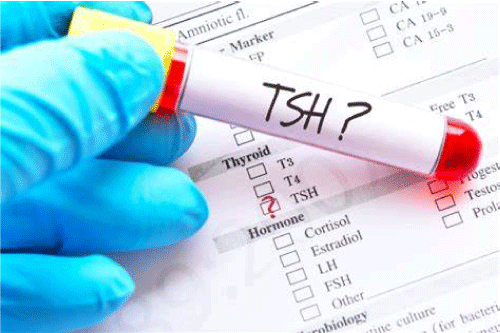What is the Full Form of TSHTSH: Thyroid Stimulating HormoneTSH stands for Thyroid Stimulating Hormone. TSH is a hormone secreted by the Pituitary Gland, which controls the metabolism and the secretion of different types of hormones in the body. TSH also helps thyroid glands in the secretion of hormones like thyroxin, which is required for good metabolism. However, the excess or lack of TSH in the body is harmful to the health of a human being. 
Now the question arises what should be the level of TSH in the body for a healthy life? According to some experts, the average level of TSH in the body is 0.45 to 4.5 milliunits per litre (mIU/L). However, the level of TSH can be different based on age, sex and lifestyle. Stress, diet and medicines can also be the reason for an extra level of TSH in the body. Thyroid Stimulating Hormone TestWith the help of the TSH test, the level of hormones in the blood is found/ calculated. To perform the test, a small amount of blood (called a blood sample) is required. The sample of the blood is sent for testing, and if, in the report of the examination, the level of the TSH comes out to be excess from the average level, then it means that the thyroid is underactive. In this case, it is also referred to as Hyperthyroidism. Besides, when the hormone level is less than the intermediate level, it means that the thyroid is overactive. In both these conditions, the treatment is based on the test report of the individual and age. Level of TSH in Different CasesAs we discussed above, there can be many reasons responsible for different levels of TSH in different people. If the TSH level is in excess of the average level, then it means that the thyroid gland is not working properly. A high level of TSH is called Hypothyroidism. In the case of a lack of thyroid hormone, the pituitary gland increases the production of TSH and reduces the difference between the levels of TSH. If the level of the TSH in the body is low, then it means that your body is producing hormones in a huge amounts, and in this case, the pituitary gland decreases the secretion of hormones to control the thyroid function. This situation is called Hypothyroidism. Talking about the level of TSH in women, after the delivery of the child, there are chances that the TSH level in the women's body is imbalanced. According to a study conducted in 2017, an increase in the level of TSH can cause thyroid cancer in older women. Besides, in the case of men, an imbalance increase or decrease in the level of TSH can reduce their fertility power. Therefore, in such a situation, it becomes necessary for the men to take the thyroid hormone replacement therapy treatment. In the case of children, TSH levels vary according to age. The TSH level of a newborn baby ranges from 1.6 - 24.3 milliunits per litre. The TSH level of a child of the age of two to twenty weeks ranges from 0.58 to 5.57 milliunits per litre. Children aged 20 weeks to 18 years usually have a TSH level ranging from 0.55 - 5.31 milliunits per litre. With the increase in the age of the children, their TSH level usually keeps reducing. During the term of pregnancy of women, it is essential to keep knowledge of their TSH level because the increase in the TSH level can sometimes lead to the miscarriage of the baby. During the first three months of the pregnancy, the TSH level ranges from 0.6 - 3.4 milliunits per litre; in the second three months, the TSH level ranges from 0.37 - 3.6 and in the last three months, it ranges from 0.38 - 4.0 milliunits per litre. In the case of Hypothyroidism, the increase in the level of TSH means that it is required to increase thyroid hormones. Whereas in the case of Hyperthyroidism, the rise in TSH shows that the treatments given to reduce the excess secretion of thyroid hormones are working correctly and are effective. Symptoms of TSHThe symptoms of increased TSH include weakness, increase in weight, swelling in the face and neck, increase in sensitivity (especially in winter), dryness in skin, thin hair, slow heart rate, untimely periods, etc.
Next TopicFull Form
|
 For Videos Join Our Youtube Channel: Join Now
For Videos Join Our Youtube Channel: Join Now
Feedback
- Send your Feedback to [email protected]
Help Others, Please Share










